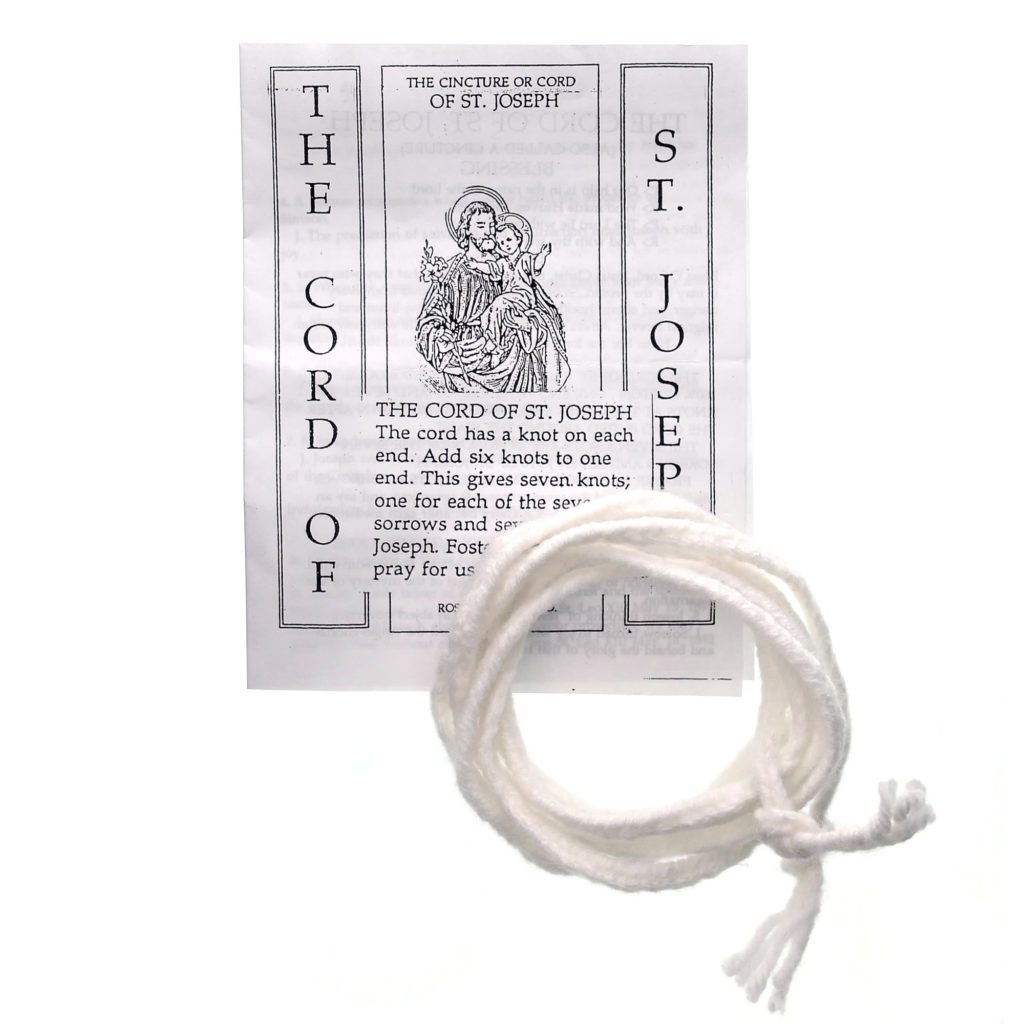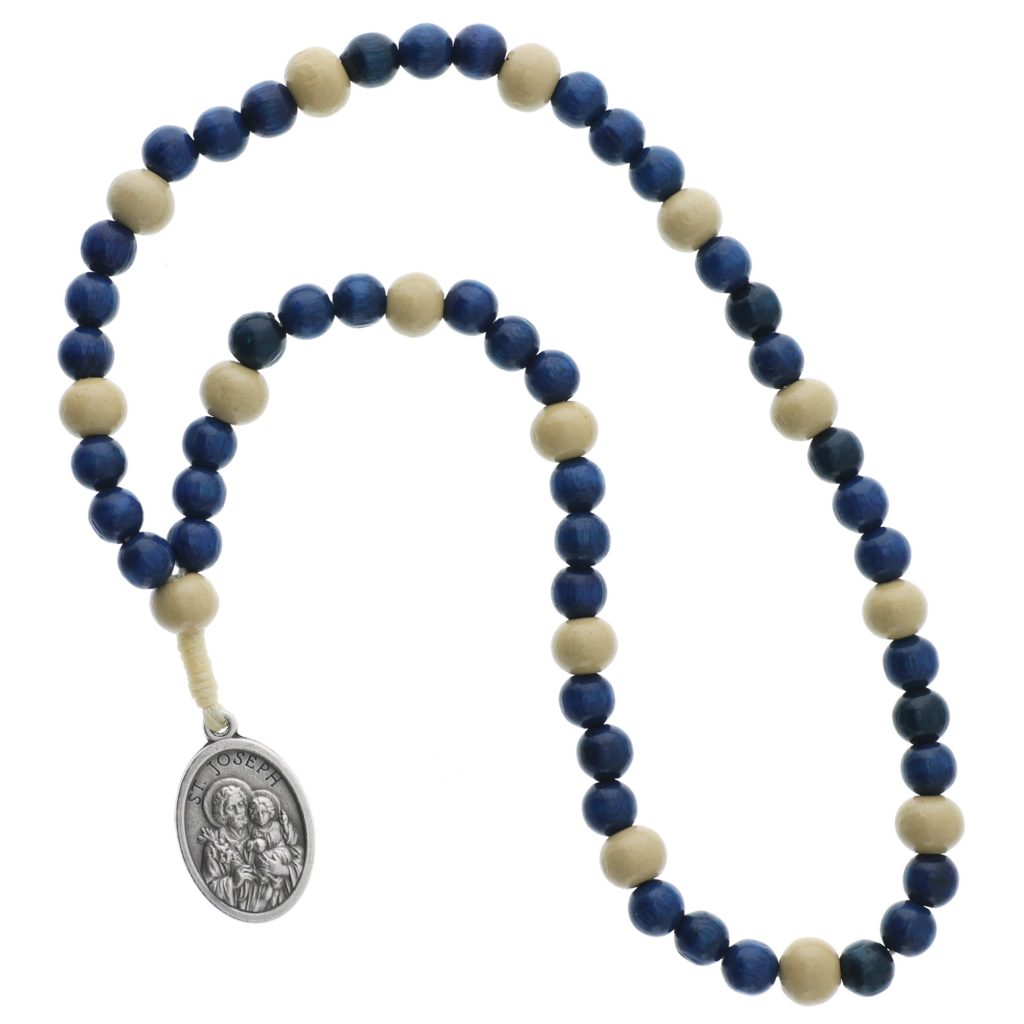Devotions
Devotions
To increase your love for St. Joseph
St. Joseph, because of his unique relationship to Jesus and Mary, is among heaven’s most powerful protectors and intercessors. Read a list of St. Joseph’s causes and patronages, as well as some of the many saints who were devoted to St. Joseph. How will you grow in your devotion to him? Here are some ideas:
St. Joseph’s Seven Sorrows and Seven Joys Devotion & the Seven Sundays Devotion
An effective means of obtaining special graces through the intercession of St. Joseph is to honor his seven sorrows and seven joys by the practicing the Seven Sundays devotion.
The Seven Sundays in honor of St. Joseph are observed by receiving Holy Communion in his honor on seven consecutive Sundays, and on each Sunday the prayers in honor of the Seven Sorrows and the Seven Joys of St. Joseph are recited. This devotion may be practiced at any time of the year, but especially on the seven Sundays preceding his solemnity on March 19th.
| JOSEPH’S SEVEN SORROWS | JOSEPH’S SEVEN JOYS |
| 1. The doubt of St. Joseph (Matt. 1:19) | 1. The message of the Angel (Matt. 1:20) |
| 2. The poverty of Jesus’ birth (Luke 2:7) | 2. The birth of the Savior (Luke 2:10-11) |
| 3. The Circumcision (Luke 2:21) | 3. The Holy Name of Jesus (Matt. 1:25) |
| 4. The prophecy of Simeon (Luke 2:34) | 4. The effects of the Redemption (Luke 2:38) |
| 5. The flight into Egypt (Matt. 2:14) | 5. The overthrow of the idols of Egypt (Is. 19:1) |
| 6. The return from Egypt (Matt. 2:22) | 6. Life with Jesus and Mary at Nazareth (Luke 2:39) |
| 7. The loss of the Child Jesus (Luke 2:45) | 7. The finding of the Child Jesus in the Temple (Luke 2:46) |
Prayers in Honor of the Seven Sorrows and Seven Joys of St. Joseph
Composed by Ven. Januarius Sarnelli, C.S.S.R. (d. 1744)
First Sorrow: The doubt of St. Joseph. (Matt. 1:19)
But Joseph her husband, being a just man, and not wishing to expose her to reproach, was minded to put her away privately.
First Joy: The message of the Angel. (Matt. 1:20)
But while he thought on these things, behold, an angel of the Lord appeared to him in a dream, saying, “Do not be afraid, Joseph, son of David, to take to you Mary your wife, for that which is begotten in her is of the Holy Spirit.
O chaste Spouse of Mary most holy, glorious St. Joseph, great was the trouble and anguish of your heart when you wert minded to put away privately your inviolate Spouse, yet your joy was unspeakable when the surpassing mystery of the Incarnation was made known to you by the Angel!
By this sorrow and this joy, we beseech you to comfort our souls, both now and in the sorrows of our final hour, with the joy of a good life and a holy death after the pattern of your own, in the arms of Jesus and Mary.
Our Father . . . Hail Mary . . . Glory be . . .
Second Sorrow: The poverty of Jesus’ birth. (Luke 2:7)
And she brought forth her first born son, and wrapped him in swaddling clothes, and laid him in a manger, because there was no room for them in the inn.
Second Joy: The birth of the Savior. (Luke 2:10-11)
And the angel said to them, “Do not be afraid, for behold, I bring you good news of great joy which shall be to all people; for today in the town of David, a Savior has been born to you, who is Christ the Lord.”
O most blessed Patriarch, glorious St. Joseph, who was chosen to be the foster father of the Word made flesh, your sorrow at seeing the Child Jesus born in such poverty was suddenly changed into heavenly exultation when you did hear the angelic hymn and beheld the glories of that resplendent night.
By this sorrow and this joy, we implore you to obtain for us the grace to pass over from life’s pathway to hear the angelic songs of praise, and to rejoice in the shining splendour of celestial glory.
Our Father . . . Hail Mary . . . Glory be . . .
Third Sorrow: The Circumcision. (Luke 2:21)
And when eight days were fulfilled for his circumcision, his name was called Jesus, the name given to him by the angel before he was conceived in the womb.
Third Joy: The Holy Name of Jesus. (Matt. 1:25)
And he did not know her until she brought forth her first born son. And he called his name Jesus.
O glorious St. Joseph you faithfully obeyed the law of God, and your heart was pierced at the sight of the Precious Blood that was shed by the Infant Savior during His Circumcision, but the Name of Jesus gave you new life and filled you with quiet joy.
By this sorrow and this joy, obtain for us the grace to be freed from all sin during life, and to die rejoicing, with the holy Name of Jesus in our hearts and on our lips.
Our Father . . . Hail Mary . . . Glory be . . .
Fourth Sorrow: The prophecy of Simeon. (Luke 2:34)
And Simeon blessed them, and said to Mary his mother, “Behold this child is destined for the fall and the rise of many in Israel, and for a sign that shall be contradicted. And your own soul a sword shall pierce.
Fourth Joy: The effects of the Redemption. (Luke 2:38)
And coming up at that very hour, she began to give praise to the Lord, and spoke of him to all who were awaiting the redemption of Jerusalem.
O most faithful Saint who shared the mysteries of our Redemption, glorious St. Joseph, the prophecy of Simeon regarding the sufferings of Jesus and Mary caused you to shudder with mortal dread, but at the same time filled you with a blessed joy for the salvation and glorious resurrection which, he foretold, would be attained by countless souls.
By this sorrow and this joy, obtain for us that we may be among the number of those who, through the merits of Jesus and the intercession of Mary the Virgin Mother, are predestined to a glorious resurrection.
Our Father . . . Hail Mary . . . Glory be . . .
Fifth Sorrow: The flight into Egypt. (Matt. 2:14)
So he arose, and took the child and his mother by night, and withdrew into Egypt.
Fifth Joy: The overthrow of the idols of Egypt. (Is. 19:1)
The burden of Egypt. Behold the Lord will ascend upon a swift cloud and will enter into Egypt, and the idols of Egypt will be moved at his presence, and the heart of Egypt shall melt in the midst thereof.
O most watchful Guardian of the Incarnate Son of God, glorious St. Joseph, what toil was your in supporting and waiting upon the Son of the most high God, especially in the flight into Egypt! Yet at the same time, how you did rejoice to have always near you God Himself, and to see the idols of the Egyptians fall prostrate to the ground before Him.
By this sorrow and this joy, obtain for us the grace of keeping ourselves in safety from the infernal tyrant, especially by flight from dangerous occasions; may every idol of earthly affection fall from our hearts; may we be wholly employed in serving Jesus and Mary, and for them alone may we live and happily die.
Our Father . . . Hail Mary . . . Glory be . . .
Sixth Sorrow: The return from Egypt. (Matt. 2:22)
But hearing that Archelaus was reigning in Judea in place of his father Herod, he was afraid to go there; and being warned in a dream, he withdrew into the region of Galilee.
Sixth Joy: Life with Jesus and Mary at Nazareth. (Luke 2:39)
And when they had fulfilled all things prescribed in the Law of the Lord, they returned into Galilee, into their own town of Nazareth.
O glorious St. Joseph, an angel on earth, you did marvel to see the King of Heaven obedient to your commands, but your consolation in bringing Jesus out of the land of Egypt was troubled by your fear of Archelaus; nevertheless, being assured by the Angel, you dwelt in gladness at Nazareth with Jesus and Mary.
By this sorrow and this joy, obtain for us that our hearts may be delivered from harmful fears, so that we may rejoice in peace of conscience and may live in safety with Jesus and Mary and may, like you, die in their company.
Our Father . . . Hail Mary . . . Glory be . . .
Seventh Sorrow: The loss of the Child Jesus. (Luke 2:45)
And not finding him, they returned to Jerusalem in search of him
Seventh Joy: The finding of the Child Jesus in the Temple. (Luke 2:46)
And it came to pass after three days, that they found him in the Temple, sitting in the midst of the teachers, listening to them and asking them questions.
O glorious St. Joseph, pattern of all holiness, when you did lose, through no fault of your own, the Child Jesus, you sought Him sorrowing for the space of three days, until with great joy you did find Him again in the Temple, sitting in the midst of the doctors.
By this sorrow and this joy, we supplicate you, with our hearts upon our lips, to keep us from ever having the misfortune to lose Jesus through mortal sin; but if this supreme misfortune should befall us, grant that we may seek Him with unceasing sorrow until we find Him again, ready to show us His great mercy, especially at the hour of death; so that we may pass over to enjoy His presence in Heaven; and there, in company with you, may we sing the praises of His Divine mercy forever.
Our Father . . . Hail Mary . . . Glory be . . .
Antiphon: And Jesus Himself was beginning about the age of thirty years, being (as it was supposed) the Son of Joseph.
V. Pray for us, O holy Joseph.
R. That we may be made worthy of the promises of Christ.
Let Us Pray.
O God, Who in Your ineffable Providence did vouchsafe to choose Blessed Joseph to be the spouse of Your most holy Mother, grant, we beseech You, that he whom we venerate as our protector on earth may be our intercessor in Heaven. Who lives and reigns forever and ever.Amen.
*** An effective means of obtaining special graces through the intercession of St. Joseph is to honor his seven sorrows and seven joys by the practicing the Seven Sundays devotion. The Seven Sundays in honor of St. Joseph are observed by receiving Holy Communion in his honor on seven consecutive Sundays, and on each Sunday the prayers in honor of the Seven Sorrows and the Seven Joys of St. Joseph are recited. This devotion may be practiced at any time of the year, but especially on the seven Sundays preceding his solemnity on March 19th.

The Chaste Heart of St. Joseph
St. Joseph is known as “the just man” and, as such, was a man of singular virtue. This strength of character, this reign of virtue, extended to all aspects of his life and his person—including his heart. His whole being was oriented to his God. His love was properly ordered, his affections purified. Unlike St. Joseph, we tend to struggle, and oftentimes fail, with matters of the heart. Our culture certainly does not hold the virtue of chastity in high esteem. Therefore, it can seem incredible to us that a man like Joseph was able to rise to the lofty challenge presented to him: to be the “chaste guardian of the Virgin” (and of all virgins) and the foster-father of the Son of God. Such a task requires both remarkable human virtue and unexcelled amounts of God’s grace. St. Joseph had both.
The tradition with regard to the age of St. Joseph varies (the Eastern Church holds that he was an old man, while the West concedes that he may have been much younger), but at the heart of the issue is the fact that it was Joseph’s virtue—not merely old age, lack or virility, or lethargic passions—that safeguarded the perpetual virginity of the Mother of God, and allowed him to guide and protect Mary and Jesus with such strength of pure love.
This should be a great consolation to us who still wander in this vale of tears, striving for holiness. St. Joseph was a great man with a “most chaste heart” but whose love was certainly not cold. For this reason, the Diocese of Charlotte’s logo for the Year of St. Joseph depicts his Most Chaste Heart inflamed with love and adorned with the white lily of purity. The heart of St. Joseph should give us great hope that purity of heart lies within our reach, thanks to the grace of God and the intercession of Joseph-most-chaste!

The Cord (Cincture) of St. Joseph
The devotional cord of St. Joseph is a practice that arose in Belgium in the mid-twentieth century following the miraculous healing of an Augustinian nun, attributed to her wearing of a white cord around her waist. This devotion endures to this day and is associated with many special graces, notably those of purity and of a happy, holy death. You can find out more and order your own devotional St. Joseph’s cord here.

The Chaplet of St. Joseph
The Chaplet of St. Joseph is a prayerful reflection on his life as the Head of the Holy Family. The traditional Chaplet of St. Joseph contains fifteen groups of four beads for the traditional fifteen mysteries of the Holy Rosary. The white beads symbolize the purity of St. Joseph and the blue beads represent his saintly piety. Find out more and order your own devotional St. Joseph’s cord here.